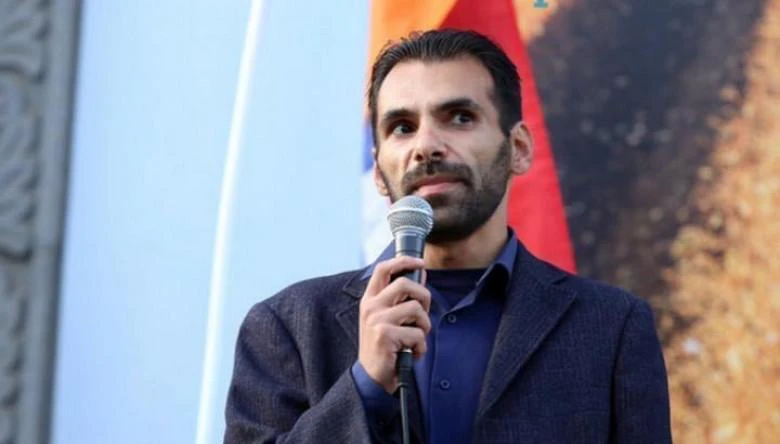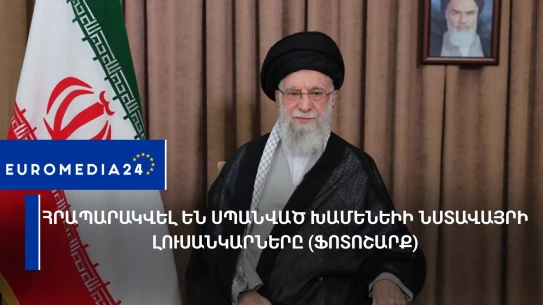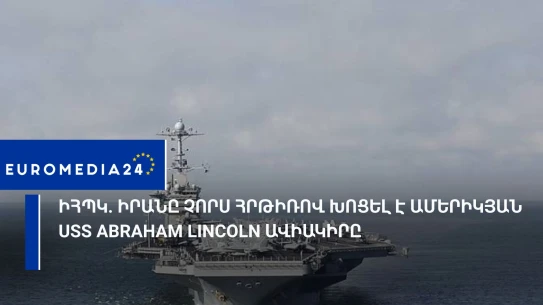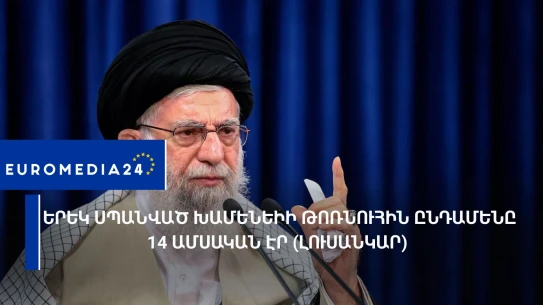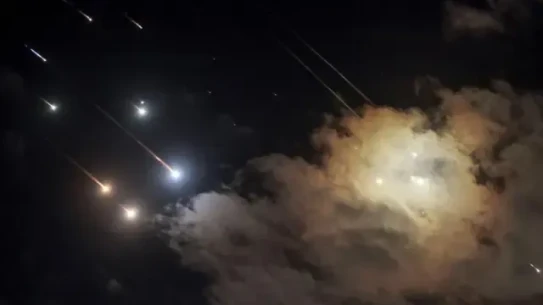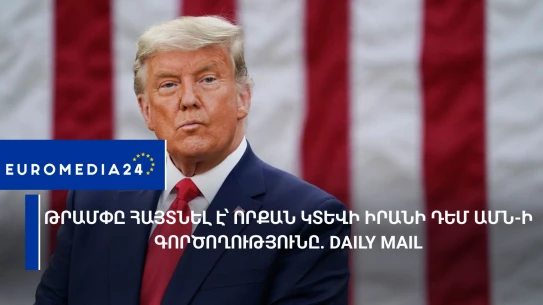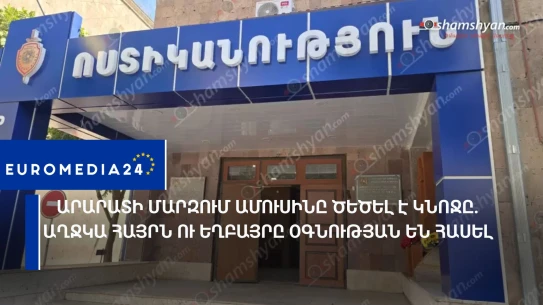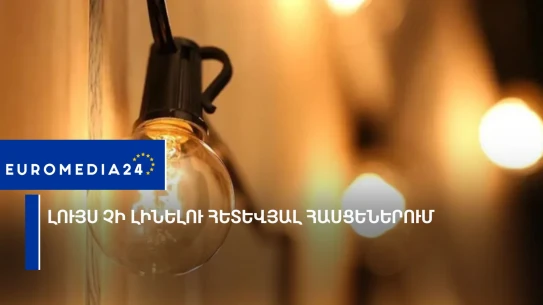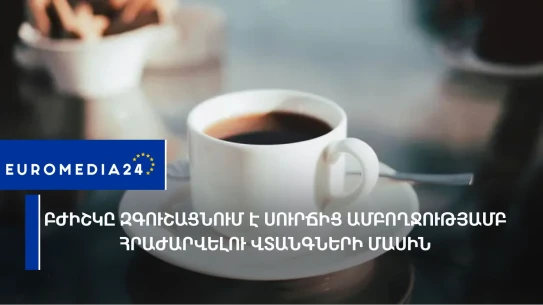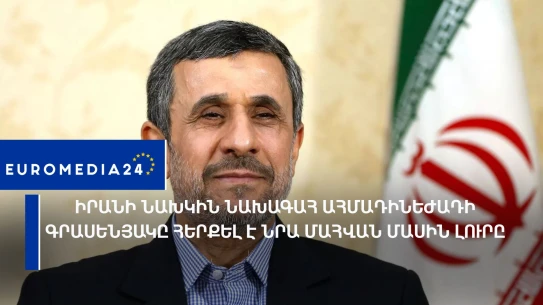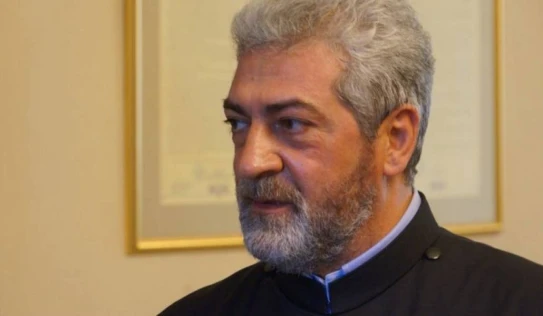"Fact" daily writes:
The establishment, strength, and institutionalism of each state is demonstrated by the doctrinal nature of both its internal and external policies. Political scientist Ara Poghosyan expresses a similar opinion when we offer to comment on the foreign policy conducted by the Armenian authorities. "Doctrinal character means the clear strategy of the given state for its future in five, ten, twenty, hundred years. In the Armenian reality, it sounds quite difficult to understand both the economic and foreign policy of the country for a long period of time. This is the result of the fact that each government of Armenia only observed the functional functions of the country in its time. This is one of the reasons why we don't have a doctrinal foreign policy. Since we don't have that, it is logical that we have a reactive and flashy foreign policy. Reactive foreign policy means that the authorities of our country respond to external challenges at the last moment, depending on the given situation, and in the case of doctrinal foreign policy, we would have a completely different situation. We would have a clear formula for how we would overcome any crisis or challenge in that formula, and where that challenge would take us. Doctrinal foreign policy is a foreign policy of opportunities, when you have a clear formula for solving each challenge, you get the maximum benefit from each challenge, not that challenge becomes a death blow for you," our interlocutor notes. According to Poghosyan, Armenia's current foreign policy can be characterized as reactive and flashy. "All our steps depend on the given moment, situation and perceptions of the government. How the given government will perceive, what kind of ties it will have with this or that center, what kind of influence it will see in the future elections inside the country, to strengthen the positions of its government, that will be the foreign policy. These authorities have promised economic growth, which has been clearly decreasing lately. Both BRICS and EAEU are primarily economic unions, where we are talking about trade circulation, technology exchange or development, logistics channels. It is also a serious political tool. But the Armenian authorities consider this as a means of trade and income. I think they are trying to hold onto their place in these economic structures, terrified of the idea that one day the country will face economic collapse. They often say that the EAEU should not be politicized, but any union is first of all a political union, and the economy is also politics," the political scientist emphasizes. Parliamentary elections were held in Georgia. According to the CEC of Georgia, the "Georgian Dream" party won the elections, the country's president and the opposition parties do not recognize the results of the elections. Even weeks ago, there were talks about possible conflicts in the country after the elections. On the other hand, Israel's attempts to involve Iran in a large-scale war continue, Iran is "stubborn" and does not want to become a party to the war. What kind of situation is our region in today, and how should Armenia position itself? "As political scientist and statesman Zbigniew Brzezinski pointed out in his famous work, let's consider the region as a chessboard, where each side is positioned according to its long-range strategy. Two main poles and other power centers derived from them are currently trying to position themselves on this regional conventional chessboard. We are talking about the West and Russia, the regional powers, and when we say the West, we should introduce a division between Europe and the United States, when talking about the European Union, we should also distinguish a number of its member states and the rest of the EU, I mean France, the Netherlands and etc., traditional states that have a pro-Armenian attitude, and states that depend on economic and other interests, may have sympathy for Azerbaijan. There are states that, being a NATO partner with Turkey, have both military and logistical interdependence with Turkey. In the panorama of all this, we see that the active pre-election campaign in Georgia started with the slogans "to Russia" and "to Europe". The West and pro-Western forces presented the government in Georgia as a force moving towards Russia, how justified this is, is a matter of discussion, and the opposite forces or the government accused the opposite camp of Georgia being a war-leader or, in other words, a "party of war". Name: The pre-election campaign took place in such a rather radical atmosphere, it was obvious that there was a struggle to strengthen the West's forces and weaken its positions. Moreover, in this case, the government was trying to keep Georgia as far as possible from being the scene of conflicts, from being a party to the conflict, by means of a pragmatic policy, on the contrary, especially recently, in the propaganda of the authorities, it was noticed that the territories separated from Georgia as a result of the war started by Russia in 2008, should be returned to Georgia peacefully. theses of joining," says our interlocutor. He adds that the government of Armenia is obliged to work with the elected government in Georgia. "We have no other way. The authorities of Armenia, especially the close-to-government circles, which criticized in one way or another, and now have begun to accuse the authorities of Georgia of fraud, etc., are causing the greatest damage to the Republic of Armenia. Whoever is in power in Georgia, we are obliged to work with him. It is the choice of the Georgian people. As for the power of this or that political bloc, I think that all centers, both Russia and the West, need the region as a whole and not Georgia, Azerbaijan or Armenia separately. Whichever side's positions are strong in Georgia, this will not mean that the region is on that side. There will always be a struggle in the region. I think the future of our region is a balanced policy, like the current policy of Georgia, which, in my opinion, is quite balanced," the political scientist emphasizes. He emphasizes that Iran, as a regional player, unlike Georgia, has a rather large influence in the region, in the Middle East, possesses quite serious resource, material, technical, technological and political resources. "Any movement in and around Iran will have a direct impact on our entire region and, in general, the Middle East and the South Caucasus. Whether these changes are positive or negative, they will definitely have an impact on the entire region. Iranian policy has traditionally been a measured, long-term foreign policy. In Iran, they understand quite well the developments taking place both in the region and in the global world. Often the illusions that Iran will start a full-scale war are perceived much more adequately in Iran. The Iranian answers also suggest that Iran does not want a full-scale war at this time, Iran is not ready to give up its position in the region as a regional power, and is ready to cooperate or go for a softening of relations with the West as well. Iran has an institutional, long-term memory of foreign policy and statehood, which is expressed in the Iranian foreign policy," concludes Ara Poghosyan.
Lusine Arakelyan
















